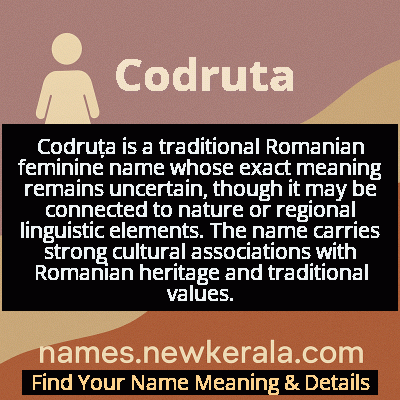Codruta Name Meaning & Details
Origin, Popularity, Numerology Analysis & Name Meaning of Codruta
Discover the origin, meaning, and cultural significance of the name CODRUTA. Delve into its historical roots and explore the lasting impact it has had on communities and traditions.
Name
Codruta
Gender
Female
Origin
Romanian
Lucky Number
1
Meaning of the Name - Codruta
Codruța is a traditional Romanian feminine name whose exact meaning remains uncertain, though it may be connected to nature or regional linguistic elements. The name carries strong cultural associations with Romanian heritage and traditional values.
Codruta - Complete Numerology Analysis
Your Numerology Number
Based on Pythagorean Numerology System
Ruling Planet
Sun
Positive Nature
Leaders, ambitious, highly driven, self-reliant, innovative.
Negative Traits
Overly aggressive, domineering, impatient, selfish.
Lucky Colours
Red, orange, gold.
Lucky Days
Sunday.
Lucky Stones
Ruby, garnet.
Harmony Numbers
2, 3, 9.
Best Suited Professions
Entrepreneurs, managers, engineers.
What People Like About You
Courage, determination, leadership.
Famous People Named Codruta
Codruța Kerezsi
Actress
Renowned Romanian theater and film actress known for her versatile performances in Romanian cinema
Codruța Săvulescu
Journalist
Prominent Romanian journalist and television presenter, known for her work in cultural programming
Codruța Dumitrescu
Academic
Respected university professor and researcher in Romanian literature and cultural studies
Name Variations & International Equivalents
Click on blue names to explore their detailed meanings. Gray names with will be available soon.
Cultural & Historical Significance
Extended Personality Analysis
Women bearing the name Codruța are typically characterized by a profound sense of integrity and authenticity that stems from their strong connection to tradition. They often demonstrate remarkable emotional intelligence, able to navigate complex social situations with wisdom and discretion. Their grounded nature makes them reliable friends and partners, valued for their consistency and depth of character. Codruțas frequently exhibit a blend of traditional values and modern practicality, allowing them to honor their heritage while engaging effectively with contemporary life. They tend to be observant and reflective, preferring to speak with purpose rather than engage in idle chatter. This contemplative nature often leads them to pursuits that require patience and dedication, whether in professional, artistic, or personal domains. Their strength lies in their ability to maintain core values while adapting to change, making them both stable anchors and progressive influences within their communities. The name suggests someone who carries the wisdom of the past while actively participating in shaping the future.
Modern Usage & Popularity
In modern Romania, Codruța occupies a unique position as a name that is simultaneously traditional and distinctive. While it never reached the popularity peaks of names like Maria or Elena, it maintains a steady, if modest, presence in naming registries. The name sees higher frequency in regions with strong traditional values, particularly in Transylvania and Moldova, where cultural preservation remains important. Among the Romanian diaspora, Codruța has gained appreciation as a marker of cultural identity, chosen by parents wanting to maintain tangible connections to their heritage abroad. Contemporary usage trends show that the name appeals to educated, culturally-aware families who value uniqueness without straying completely from tradition. Digital platforms have introduced Codruța to global audiences, where its distinctive Romanian character makes it memorable. While statistical data shows it's not among the top 100 names in recent years, its continued usage ensures it remains part of Romania's living naming tradition rather than fading into historical obscurity.
Symbolic & Spiritual Meanings
Symbolically, Codruța represents the enduring connection between personal identity and cultural heritage. The name evokes images of deep roots and steady growth, suggesting an individual who draws strength from tradition while reaching toward the future. Its potential association with forests symbolizes shelter, wisdom, and the interconnectedness of all life—themes deeply embedded in Romanian folklore and spiritual traditions. Metaphorically, Codruța embodies the concept of cultural transmission, representing how names carry forward ancestral stories and values into new generations. The name suggests a person who serves as a living bridge between past and present, honoring traditions while contributing to their evolution. In a broader sense, Codruța symbolizes the resilience of cultural identity in the face of globalization, representing the choice to maintain distinctive cultural markers rather than assimilate completely into international norms. The name carries the symbolic weight of preservation—not as static conservation, but as active engagement with heritage in contemporary contexts.

